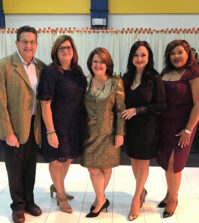George Melikokis, A Reigning Patriarch and Advocate for Greek Education
by Athena Efter
Born in Evrytania in Central Greece, George Melikokis is a man of few words and many degrees, but as a champion of Greek education, his voice remains outspoken. For over forty years, George has been a strong supporter and advocate of Greek language and culture, and effective pedagogy for Greek Paideia.

A graduate of the Teachers’ College in Greece, he taught grades one through six in the Greek elementary school system, before emigrating to the United States in 1966 to continue his studies. He received a B.A. in sociology with a minor in psychology from Hunter College, and a second B.A. in education with a minor in philosophy. He then went on to graduate school at Fairfield University in Connecticut where he received an M.A. in comparative education and administration. His studies did not stop there. To be an advocate of education you don’t necessarily have to reach for the highest degree, but it helps to know your stuff, and know it well, so he had one more tier to go before he would step up to build a curriculum, and step down to build his next step.
With one more degree to go, Dr. Melikokis received his Ph.D in curriculum development and educational research from New York University. This degree and his experience would lead him to create a curriculum for students learning Greek. With a team of three educators from Greece, and one being a well-known published children’s author, he created the curriculum and topics for the books “Mathaino Ellinika” or “I learn Greek”. The publication of these books has become one of his greatest contributions to Greek education. They included input from Emmanuel Vasilakis who served as an advisor in the Consulate General’s Office in New York, Emmanuel Hatziemmanuel who served a Director of Education in the Greek Orthodox Archdiocese, and Zoe Kavvalaki from Greece.

The goal of these books was to create effective learning material for the acquisition of Greek language skills that could be used in all Greek-American day and afternoon schools. These books are still used in most Greek schools in America for almost 21 years now. In 2000, Dr. Melikokis wanted to revise them, but The Education Department of The Greek Orthodox Archdiocese wanted to write and publish their own books “Ta Ellinika Mou” or “My Greek”. After 20 years of publication, he admits the books he created with his team need to be revised, but not in methodology. The revision can be done in vocabulary. The amount of words being taught can be reduced from 3500 to 2500 or 2000 words according to Dr. Melikokis. Many of these words are not used in the everyday vocabulary of Greek-American culture. Is this considered a “dumbing down” of Greek language? Surely I had to ask that question, but it’s happening even in Greece. The language is becoming, for lack of a better word, more simplified. The variety of accents over vowels to distinguish intonation are now reduced to one symbol. Is this considered progressive Greek? Or can we still call it Modern Greek? As an educator, Dr. Melikokis agrees you have to go with the times and also make the language more accessible. I’m not sure how the Chinese would feel about that. Have they cut the symbols in their language to make Mandarin, one of the hardest languages to learn, more accessible? Regardless Dr. Melikokis emphasized that “students learn best when they start out with language they can use and relate to in everyday life.”
On that note, he is a strong proponent of the Rassias Method or the Dartmouth Intensive Language Model, an innovative method developed by John Rassias of Dartmouth College on how to teach languages effectively, and within a short period of time. This method involves a creative approach to teaching language. It uses dramatic technique and specific teaching procedures to help students feel a sense of freedom from the very first class. The emphasis is on the everyday spoken language and the culture of the language being studied. Through the Rassias Method students gain a profound sense of understanding and familiarity through imagination, creativity and positive reinforcement.

Long gone are the days where your Greek school teacher pulled you by the ear, tapped you with a ruler, or scolded you because you couldn’t pronounce or understand a specific word…yes that word. That Greek word that many of us have buried so deeply into our subconscious mind. That word we hid in the dark corners of our flip top desks, fearing it would jump out at any minute to unleash its terror on us, making its way into the furrowed brows and pursed lips of our Greek teacher’s great dismay and disappointment. It’s that fuzzy mumble jumble of a word we couldn’t pronounce or read. It’s that word that would get Mrs. Popolopolopolopoulos, or something like that, to put the pep in her step as she proceeded to stomp her feet toward you like a drill sergeant carrying a book on Draconian law. Yes, that word. It’s that long Greek word, so deeply personal and unique to any first or second generation Greek-American student learning Greek, which has become the Achilles Heel that many of us still drag along, like some kind of torture device inflicted upon us by our strictest Greek School teacher.
It could be any word in Greek, but surely we all had that word that we are still trying to learn and pronounce, let alone spell, on our journey into bilingual proficiency. If taught correctly words can become more “user friendly”. Dr. Melikokis wants to see to it that the Rassias Method of instruction is brought into all Greek-American day and afternoon schools. As a grandfather of a second generation child, who is of partial Greek heritage, it’s important to him to see that Greek is not lost on his generation. With the Rassias Method of instruction, he agrees that learning Greek can be fun and engaging.
Dr. Melikokis , a certified administrator in NYC, NY State, and Connecticut, started out his tenure under the appointment of Archbishop Iakovos. In 1980, he was hired to be the assistant principal of Sotirios Ellinas Parochial School, now the seat of the Hellenic Classical Charter School. It ran from pre-k through eighth grade. He served for two years as an assistant principal, and then quickly got promoted to principal.
His tenure there lasted up until 1990, when he decided to switch gears and join the world of construction management. He knew nothing about the business when he started, but he found himself entering a new world, where the learning curve was equally, if not more, challenging. With the same dedication he applied to learning “the mortar and bricks” of education and curriculum development, he applied his thirst for knowledge to help develop successful companies in the business of construction.
While building curriculum and making strides and steps in the world of Greek education might be his true passion, one also has to have a back-up plan when the state of Greek education in the Greek-American community finds itself on unstable ground with no guarantee for its future. He rose the ranks to become a top administrator in the construction industry. Still Dr. Melikokis, with his unwavering dedication and loyalty, never turned his back on his goal to make Greek education a viable system of learning for Greek-American students of the diaspora whose families want them to retain a connection to their rich culture and heritage.
In 2007 he was summoned to the call of philanthropic duty to serve as principal of St. Demetrios, Jamaica Day School, which served grades Pre-K through eighth. In his post, he did not take a salary. He was called to active duty, like a real soldier and pioneer for the future of Greek education, to save a struggling school, but a lack of funding made this a futile yet valiant attempt to save the future of Greek-American day schools. In 2012, it closed its doors.
One has to ask why so many schools in the Greek-American parochial school system continue to struggle with the exception of the very few that still manage to survive. Is this the failure of the Greek Orthodox Archdiocese or the failure of the community? If we take the history of why these parochial schools were started, one cannot separate the religious component from Greek culture. These schools were, and still are, under the leadership of the Greek Orthodox Archdiocese. Are they falling victim to a greater institutional struggle or is there a lack of interest from the community? These are deeper questions, perhaps not so philosophical, but more grounded in institutional politics that can open a forum of thought for real dialogue. There are, however, leaders in the community, like Dr. Melikokis who will not stop advocating for the future of Greek education.
Working closely with the Cordell Hull Foundation for International Education, which is a not-for-profit organization that has sponsored several teachers since 1951, Dr. Melikokis has been a driving force in getting qualified teachers to come from Greece to teach Greek and help acclimate them more comfortably into American culture. He gives various seminars on “culture shock” and supervises teachers in the classroom. As a consultant for Greek education, he serves on various boards of the Greek parochial school system including St. Demetrios School in Astoria and the Archangels Greek Afternoon school in Stamford, Connecticut where he resides. He has published over 75 articles in various Greek publications addressing education. He is the recipient of many awards and honors for his contributions to Greek language and culture that included a plaque given to him in the US Capitol twice, once by the World Council of Hellenes Abroad (SAE) and once by the Federation of Greek American Teachers. Other awards and honors were bestowed to him through the AHEPA Chapter of Connecticut, Hermes Expo, and the Evrytania Association. In his spare time, he enjoys gardening, planting flowers and vegetables, in the memory of his late wife Vassiliki.
It is his hope that the newly enthroned Archbishop Elpidophoros will revitalize and reorganize the Greek Education Department so that all the schools under their umbrella share one unified umbrella that educates students in both Greek-American day and afternoon schools with a unified mission. This mission would be heralded by a curriculum that includes a study of Greek language, history, religion and culture that teaches students to appreciate and effectively retain their heritage as students of the Greek diaspora, without a dogmatic and nationalistic approach, but an objective understanding and appreciation of their language and culture. With his business acumen and experience, he also knows how to create cost-effective solutions to help schools achieve the results they want within budget. He has a plan on how schools can save money by creating a unified administration.
Dr. Melikokis will continue this advocacy. He is an unstoppable voice, but without the support of fellow educators and the leadership that is devoted to the continuation of the Greek American Parochial school system mission, he is a voice on his own. Whether its 3500 hundred words or 2500 hundred words in high Greek that we continue to teach or reduce in an effort to teach Greek effectively, action is a universal language that requires a team of people with a vision and inspiration that can bring forth progress and tangible results.
In light of the recent resignation of the principal at The Cathedral School, the flagship school of the Greek Orthodox Archdiocese that was supposed to carry the torch for academic excellency, and did for a several strong years, I have to ask why, yet again, in a span of four years, did they lose another principal? I didn’t get a chance to ask Dr. Melikokis this question, but perhaps he knows where the failure of the system lies. Without a unified administration and a unified curriculum, it is the teachers and students who pay the price.
These schools can be saved, if not through the Greek Orthodox Archdiocese then maybe through a team of qualified educators who can create or reorganize an independent system of Greek schools that can thrive for many Greek-American generations to come. That would be a last resort option for Dr. Melikokis. If I were to read between the lines, the Greek Education Department, which is responsible for the creation of these schools has to reclaim accountability and restructure the future of these schools, with the right guidance, or the Greek-American language and culture they sought to preserve could very well get lost. For all of his years of service and contributions to Greek education, perhaps Dr. Melikokis’ efforts to introduce the Rassias Method of language instruction in Greek-American schools could be an approach worth exploring and a great start to curriculum unification in the study of Greek language and culture.















0 comments